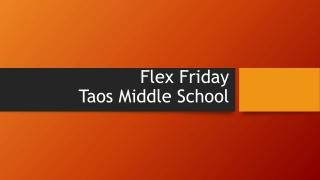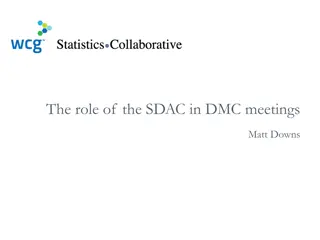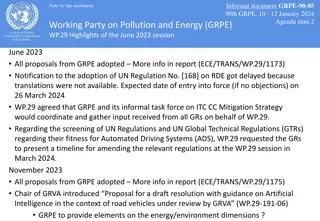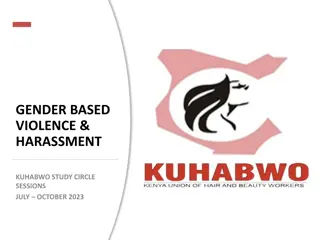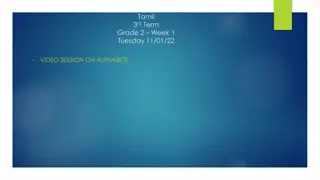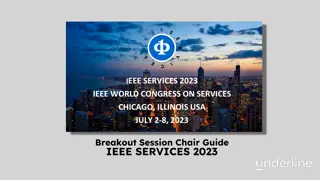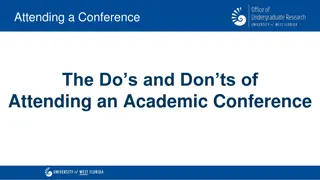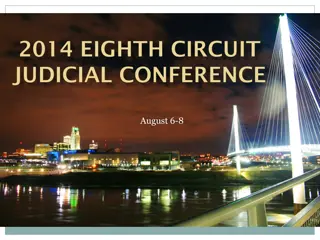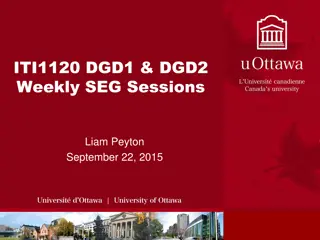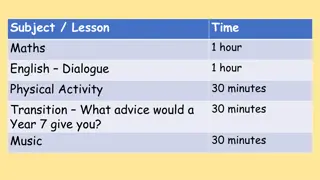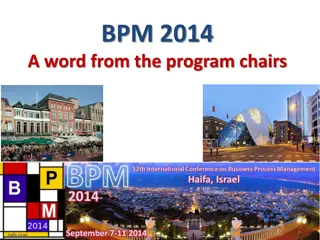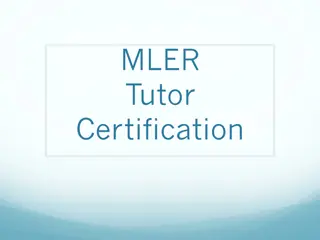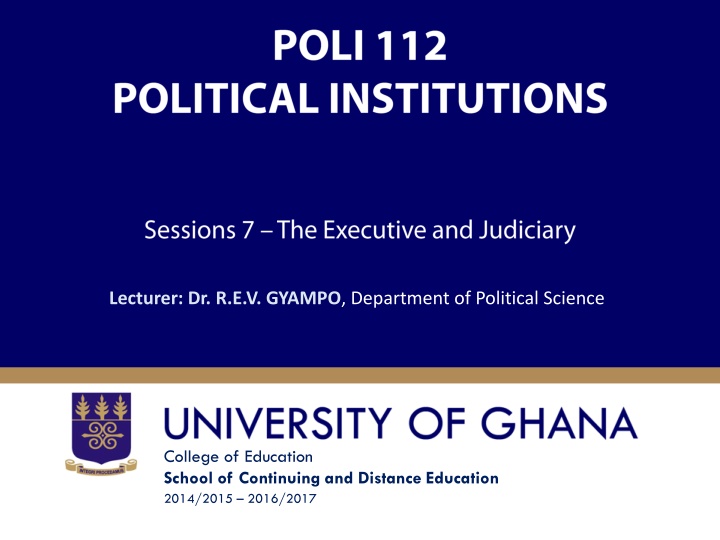
Understanding Executive Powers in Political Systems
Delve into the concept of the Executive in political systems, exploring its functions, types, growth, and potential dangers of excessive power. Learn about parliamentary, presidential, and neopresidential systems, as well as the implications of unchecked executive authority.
Download Presentation

Please find below an Image/Link to download the presentation.
The content on the website is provided AS IS for your information and personal use only. It may not be sold, licensed, or shared on other websites without obtaining consent from the author. If you encounter any issues during the download, it is possible that the publisher has removed the file from their server.
You are allowed to download the files provided on this website for personal or commercial use, subject to the condition that they are used lawfully. All files are the property of their respective owners.
The content on the website is provided AS IS for your information and personal use only. It may not be sold, licensed, or shared on other websites without obtaining consent from the author.
E N D
Presentation Transcript
Lecturer: Dr. R.E.V. GYAMPO, Department of Political Science College of Education School of Continuing and Distance Education 2014/2015 2016/2017
The Executive This is the rule-enforcement body of state. Offices under it include the Presidency, Police armed forces, ministers, etc It is that state institution responsible for policy formulation and implementation In terms of types, two main categories have been identified. The Parliamentary and Presidential Types with a gradual emergence of a third type which is the fusion of the features of the two called Neopresidentialism Slide 2 Dr. R.E.V. GYAMPO, Dept of Political Science, UG
It is for example practiced in Britain while the Parliamentary& Presidential Executive The basic feature of the Parliamentary system is that it operates on the concept of fusion of powers. In this regard, the executive and even some members of the judiciary are found also in the legislature. This is practiced for instance in Britain. The Americans have the Presidential system which at least in theory, operates the concept of Separation of Powers. Ghana practices Neopresidentialism which hybrids the features of the two main systems. Slide 3 Dr. R.E.V. GYAMPO Dept of Political Science, UG
Functions of the Executive Policy Formulation and Implementation Maintenance of Law and Order Quasi-Judicial and Legislative functions through the exercise of Prerogative of Mercy and the signing of bills before they become laws respectively Formulating foreign policy decisions Co-ordinating all governmental activities of ministries, departments and agencies Slide 4 Dr. R.E.V. GYAMPO Dept of Political Science, UG
Growth in Executive Powers The Executive arm of government is perceived as powerful than the other arms. Several factors account for this, including: Access to expertise The exercise of delegated powers Control of coercive apparatus of state The excessive partisanship of parliamentary deliberations that renders parliament as a mere rubber stamp of executive decisions Slide 5 Dr. R.E.V. GYAMPO Dept of Political Science, UG
Dangers of Excessive Powers of the Executive It could lead to the abuse of power resulting in the emergence of dictatorship It may lead to the disregard of the rights of the people especially where the judiciary lacks independence Democratic values and principles may be abandoned and minority interests set aside The executive may also resort to force to entrench its rule, though it may have lost its legitimacy and authority to rule Slide 6 Dr. R.E.V. GYAMPO Dept of Political Science, UG
Limiting the Powers of the Executive Constitutional limitations Judicial review, where the courts can declare the actions of the executive unconstitutional Parliamentary control, where parliament for instance have to approve ministerial nominations from the executive and other policies of the executive before they can have full effect The existence of multi party system and public opinion The conduct of periodic elections. Slide 7 Dr. R.E.V. GYAMPO Dept of Political Science, UG
The Judicial Arm of Government It is the rule interpreting body. Even though the specific role of the judiciary varies from one political system to the other, a rigid distinction is sometimes drawn between: the liberal judicial system of the Western countries and the Soviet system which characterizes the countries of the former communist bloc. The soviet or communist judicial system was characterized as political or subject to the control of the sole ruling party. on the other hand, liberal judicial systems of the west are considered non-political. Slide 8 Dr. R.E.V. GYAMPO Dept of Political Science, UG
Recruitment of Judges Judges may be recruited through the following means: Appointment by the government In Ghana, for instance, the president in consultation with the council of state and judicial services commission may appoint the chief justice Elections directly. In some countries, judges gain their positions after being voted for in an election Competitive exams and judicial training- In some countries, judges are appointed after a successful exam. They are later given training. Slide 9 Dr. R.E.V. GYAMPO Dept of Political Science, UG
Functions of the Judiciary Statutory interpretation Only the courts can determine the meaning of the laws and apply them to particular situations. Judicial Review This is the power of the court to take a second look at actions of the executive and laws passed by the legislature to declare them either ultra vires or intra vires, constitutional or unconstitutional Arbitration The courts arbitrates and settles disputes between people, institutions, government and individuals etc Quasi-Legislative function The fact that the judiciary exercises the function of statutory interpretation, judicial review and application of precedents gives it a share in legislative power. Rights Protection The courts protect the rights of the individuals in the state. The constitution of a country and the UN spells out the fundamental human rights of all human beings and the court must enforce these rights. Slide 10 Dr. R.E.V. GYAMPO Dept of Political Science, UG
Control of Judges Judges are quite independent and many reasons make them so. In most democracies, once appointed, judges cannot be dismissed easily and their salaries cannot be varied to their disadvantage when in office. In many countries, they retire on their salaries. In spite of these, judges are liable to control by the other arms of government. The following are some of the ways in which judges can be controlled: Slide 11 Dr. R.E.V. GYAMPO Dept of Political Science, UG
Control of Judges (cont) Judges are appointed by the executive and executive co- operation is always required to implement judicial decisions. The president can also pardon those convicted by the executive in exercising his power of prerogative of mercy. The legislature can also make laws to regulate the activities of the judiciary. They can also amend the constitution to compel the judiciary to take no other view than the view intended by the legislature. In countries where judges are elected, they can be voted out of office in the next elections Judges can also be criticized by the public should they fail to discharge their duties independently and creditably Slide 12 Dr. R.E.V. GYAMPO Dept of Political Science, UG
The Ghanaian Court Judges Slide 13 Dr. R.E.V. GYAMPO Dept of Political Science, UG
Reading List Refer to Unit 3, pp. 52-63 of Poli 112 (Political Institutions) Modules Gyampo, R.E.V. The state of Political Institutions in Ghana, (Saarbrucken, Germany: Lambert Academic Publishing Inc. 2012) pp. 93-106 Slide 14 Dr. R.E.V. GYAMPO Dept of Political Science, UG
Concluding Remark Brace yourself for Lecture 6 THANK YOU Slide 15 Dr. R.E.V. GYAMPO Dept of Political Science, UG

